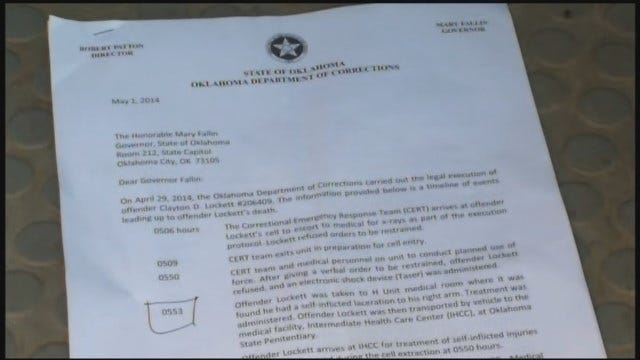DOC Releases Timeline Of Clayton Lockett's Execution
The Oklahoma Department of Corrections has released a document that details a list of events on the day of the execution of inmate Clayton Lockett.Thursday, May 1st 2014, 3:37 pm
By News9.com
OKLAHOMA CITY -- The Oklahoma Department of Corrections has released a document that details a list of events on the day of the execution of inmate Clayton Lockett.
4/30/2014 Related Story: Oklahoma Inmate Execution Halted, Dies From Heart Attack
DOC Director Robert Patton released the document Thursday afternoon. According to the document, at 5:06 a.m. Tuesday, the Correctional Emergency Response Team arrived at Lockett's cell to escort him to the medical room for an x-ray exam as part of the execution protocol. However, Lockett refused orders to be restrained.
4/30/2014 Related Story: Governor Fallin Calls For Independent Review Following Botched Execution
At 5:50 a.m., Lockett continued to refuse orders to be restrained. Authorities say they had to use a Taser on him. Lockett was then taken to the medical room, and officials found out that he had a self-inflicted wound on his right arm. A physician assistant examined his wound and determined that sutures were not needed.
Department Of Corrections Letter Regarding Clayton Lockett
After being treated for the wound, Lockett was transported to the Intermediate Health Care Center (IHCC) at the Oklahoma State Penitentiary.
At 6:45 a.m., Lockett was moved to an observation cell at the IHCC. Officers were assigned to check up on him every 15 minutes until 5:19 p.m.
Authorities offered Lockett a food tray twice, once at 9:42 a.m. and once at 11:11 a.m.. However, he refused the food tray both times. Lockett also refused visits from his attorneys.
At 4:10 p.m., Lockett was taken to the SW shower, the final holding cell before the execution. After visiting with mental health officials, at 5:19 p.m., Lockett was escorted to the execution chamber.
At 5:22 p.m., Lockett was placed and restrained on the execution table. Shortly after, a Phlebotomist entered the execution chamber to determine an appropriate placement for IV. The Phlebotomist examined Lockett's arms, legs, and feet to find a viable insertion point, but no viable point of entry was located. The doctor then examined Lockett's neck and groin area.
The IV insertion process was completed at 6:18 p.m. The insertion point was covered with a sheet to prevent witness viewing of the groin area.
The Phlebotomist then left the execution chamber. At 6:23 p.m., the warden received approval to proceed with the execution from Director Patton. That's when shades in the execution chamber were raised.
Lockett declined the opportunity to make a final statement, and the warden began the execution. Midazolam was administered intravenously.
At 6:33 p.m., a doctor determined that Lockett was unconscious. Vecuronium bromide was then administered intravenously, followed by potassium chloride.
Officials lowered the shades at 6:42 p.m. as the Phlebotomist and the doctor checked the IV. Between 6:44 p.m. to 6:56 p.m., the doctor reported the Lockett's blood vein had collapsed, and the drugs had either absorbed into his tissue, or leaked out, or both.
The warden immediately contacted Director Patton by phone and reported the information. The director asked if enough drugs had been administered to cause death, to which the doctor replied "no." Director Patton then asked if another vein was available and if there were enough drugs remaining, the doctor said "no" to both questions.
According to the document, the director then requested clarification as to whether enough drugs had been administered to cause death, and the doctor said "no."
The doctor then checked Lockett's heart beat. He found a faint heart beat and Lockett was unconscious.
At 6:56 p.m., Director Patton called off the execution order under the authority granted by the Governor. At 7:06 p.m., the doctor pronounced Lockett dead.
Base on the review of the execution, the DOC Director recommended the following actions,
1. Conduct a complete review/revision to the execution protocols.
2. Request an indefinite stay of execution.
3. Investigation of circumstances surrounding the execution.
More Like This
May 1st, 2014
April 23rd, 2025
Top Headlines
April 25th, 2025
April 25th, 2025
April 25th, 2025
April 25th, 2025










